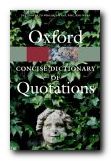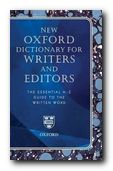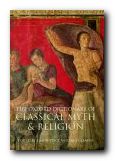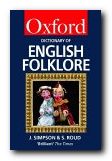who said what, why, when – and about whom
This Concise Dictionary of Quotations is a cut-down version of the fifth edition of the Oxford Dictionary of Quotations. It contains over 9000 quotations from more than 2500 authors, and maintains its extensive coverage of literary and historical quotations. New material has been added from today’s influential literary and cultural figures. Entries range alphabetically from Diane Abbot (UK MP) to Emile Zola and Zoroastrian Scriptures. Chronologically, they run from classics which still seem up to date, as in ‘Everyone is quick to blame the alien’ (Aeschylus, 456 BC) and ‘Rumour is not always wrong’ (Tacitus, AD 95) – to pithy laments from recently deposed politicians.
 The standard quotations from written texts have also been supplemented by ‘Sayings and Slogans’ drawn from the world of advertising and politics, newly coined catchphrases, film lines, recent newspaper headlines, and popular modern sayings. There’s also an appendix of famous film lines and last words, amongst which my favourites were Mae West’s ‘Lets get out of these wet clothes and into a dry Martini’, or Oscar Wilde, speaking of the wallpaper in the room where he was dying: ‘One of us must go’.
The standard quotations from written texts have also been supplemented by ‘Sayings and Slogans’ drawn from the world of advertising and politics, newly coined catchphrases, film lines, recent newspaper headlines, and popular modern sayings. There’s also an appendix of famous film lines and last words, amongst which my favourites were Mae West’s ‘Lets get out of these wet clothes and into a dry Martini’, or Oscar Wilde, speaking of the wallpaper in the room where he was dying: ‘One of us must go’.
Many entries are not so much quotations as extracts from famous texts. The Bible, Shakespeare, Milton, and poets such as Pope, Keats, Browning, and Eliot are all heavily represented.
This is the sort of book you would consult if you saw a well-known phrase such as ‘Earth has not anything to show more fair’ and didn’t know it was from Wordsworth, or ‘Patriotism is the last refuge of a scoundrel’ and didn’t know it is by Samuel Johnson.
Searches are made either by author in alphabetical order, or via a huge index of key words which traces quotations and their authors.
Woody Allen 1935-
I recently turned sixty. Practically a third of my life is now over.in Observer 10 March 1996 ‘Sayings of the Week’
What’s the difference, you might ask, between this and the Dictionary of Quotations by Subject and the Dictionary of Literary Quotations?
The answer is that although this also uses writers and artists as sources, the main intention here is to include quotations from all the main sources – religious texts, Greco-Roman classics, and the original sources include political figures, people from the worlds of sport and entertainment, and various nonentities who have managed to make themselves famous just by the odd bon mot.
© Roy Johnson 2003
Elizabeth Knowles (ed), Oxford Concise Dictionary of Quotations, Oxford: Oxford University Press, 2003, pp.547, ISBN: 0198607520
More on dictionaries
More on language
More on literary studies
More on grammar








